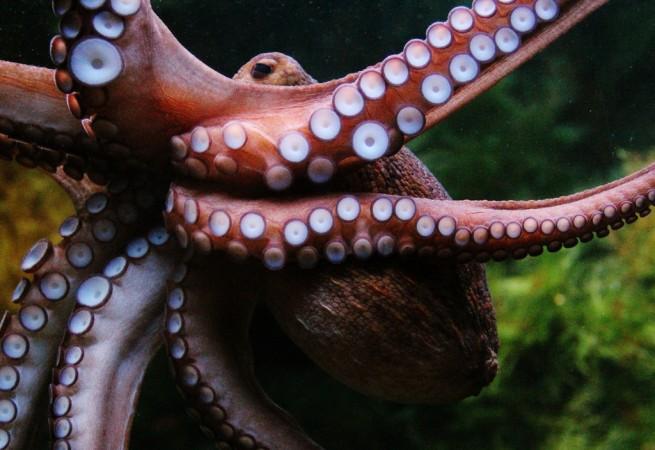
Scientists have found a genetic, evolutionary link between the social behaviour of octopuses and humans. The two species—humans and octopuses—separated from a common ancestor on the evolutionary tree by about 500 million years and yet there are similarities.
How did researchers come to this conclusion? Drugs. A number of asocial, or not so friendly octopuses were administered MDMA, or more popularly known as Ecstasy, E, or Molly- a psychoactive drug. The "Hug Drug" as it is sometimes referred to is known to move people to hug and touch each other frequently and it had the exact effect on the octopus as well, notes a statement from the Johns Hopkins University.
If the findings are validated, notes the report, this could open up research into how psychiatric drugs and related therapy could work on animals that are similarly distantly related to humans.
Brains of octopuses are more similar to those of snails than humans, said Gül Dölen, of the Johns Hopkins University School of Medicine who served as the lead investigator. "but our studies add to evidence that they can exhibit some of the same behaviours that we can."
"What our studies suggest is that certain brain chemicals, or neurotransmitters, that send signals between neurons required for these social behaviours are evolutionarily conserved."
Dölen goes on to explain that octopuses are known to be rather smart. Apart from the way they can trick prey to come to them and in spite of being gelatinous invertebrates, they learn by observing their surroundings and scientists believe that they have episodic memory. They are well known for easily escaping their tanks stealing others' food, hiding away from caretakers and even sneaking around, notes the report.

However, octopuses, for the most part, are not social creatures and keep to themselves, not really living with even other octopuses. In spite of this, researchers thought there could still exist a long-lost link between octopuses and humans because of genetics as well as other behaviours that they exhibit.
One of the many places to look for links such as this was in the genomics that guide neurotransmitters—signals that neurons fire off between each other, notes the report.
Four male and female octopuses were exposed to MDMA and placed in the experimental chambers. The chambers were three connected water reservoirs: one was kept empty, one had a plastic action figure, and the last one had one male or a female octopus inside a cage.
The drugged-out octopuses were then released into the chambers for 30 minutes. All four of them spent more time in the chamber where the male octopus was caged than the other two chambers. "It's not just quantitatively more time, but qualitative. They tended to hug the cage and put their mouthparts on the cage," Dölen says.
"This is very similar to how humans react to MDMA; they touch each other frequently."
When sober, they avoided the caged octopus, say the researchers.
The experiments suggest, says Dölen that brain circuits guiding social behaviour among octopuses are strong in normal conditions — when they are sober—but they could have been suppressed by natural or other circumstances as well.
"Octopuses will suspend their antisocial behaviour for mating, for example. Then, when they are done mating, they go into aggressive, asocial mode," says Dolen.
The study was first published in the journal Current Biology.








